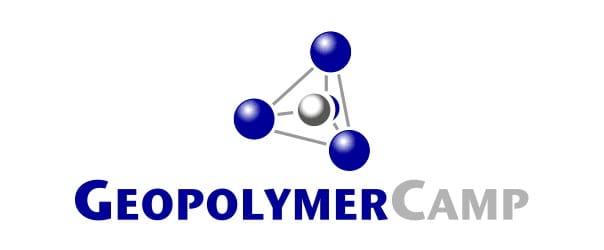Geopolymer Camp
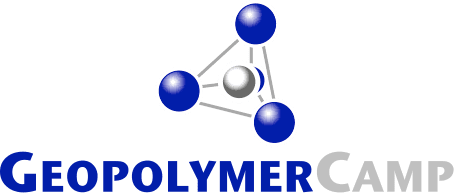
17th Geopolymer Camp: 2025, July 07 to 09th, with TUTORIAL (short courses for Newcomers)
Registration for 2025 is OPEN
Subscribe to the newsletter
The Geopolymer Institute organizes a “GeopolymerCamp”, every year, at Saint-Quentin, north of Paris, France.
The first Geopolymer Camp (GPCamp 2009) was held on July 1-3, 2009. See the reports and watch videos of keynotes conferences and photos of the last Geopolymer Camps here:
| GPCamp 2009 | GPCamp 2010 | GPCamp 2011 | GPCamp 2012 |
| GPCamp 2013 | GPCamp 2014 | GPCamp 2015 | GPCamp 2016 |
| GPCamp 2017 | GPCamp 2018 | GPCamp 2019 | GPCamp 2020 |
| GPCamp 2021 | GPCamp 2022 | GPCamp 2023 | GPCamp 2024 |
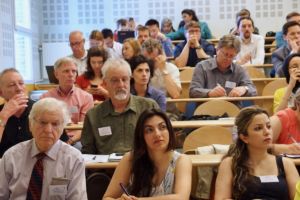
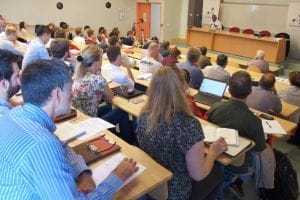

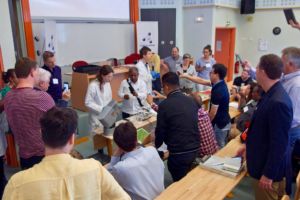
Why?
To get geopolymer fans together, learn from each other, figure out the future of geopolymer applications and chemistry, and have a good time. You’ll have 2 days for learning, presenting, sharing, chatting, at super saver-cost of 75 € (excluding fees for TUTORIAL). We have decided to break down the infernal spiral of costs that is undermining the exchanges between the scientific communities. Conferences with registration fees of 800-1000 dollars (600-700 euros) are non-sense. Apparently this is what some scientists are ready to pay because of the infamous publish or perish request from their administration. We want to change this trend into learn OR perish. It is now so easy to make a publication in a regular journal, because there are so many, that it becomes no longer accurate to spend these enormous fees just to see his conference presentation on a webpage (Proceedings), not on paper.
Let start a new era, return to what it was, 50 years ago, when conferences and gatherings were affordable. COME TO THE GEOPOLYMER CAMP!
GeopolymerCamp: What’s this all about?
GeopolymerCamp is an ad-hoc gathering born from the desire to share and learn in an open environment. It is an intense event with discussions and interactions from participants.
The Geopolymer Camp is very special in terms of presentation, participants, costs and fees. It is not a conference, nor is it a congress based on extravagantly high registration fees and luxury accommodation costs. It is a casual, informal meeting between anyone who has something to share, to communicate, and anyone who has a desire to learn, to interact and to meet people. Everyone is welcome and invited to attend.
Who shall attend?
Students, scientists, researchers, engineers from public and private organizations, curious or long-term experienced people in their fields of expertise, professionals involved in a wide range of development, including managers, finance specialists, R&D, marketing, business decision makers, technology and products development specialists, etc. Upon request, we will also deliver a certificate of attendance if your organization asks for it.
When you come, be prepared to share with geopolymer “campers”.
When you leave, be prepared to share it with the world.
Main purposes of GeopolymerCamp:
The GeopolymerCamp is at the opposite of a classical scientific conference: diversity of backgrounds, variety of topics, easy exchanges and connections, yet with up-to-date high quality, high-tech knowledge.
- Meet with people from all over the world and build a network: 50% are from the industry at large, 35% are academic, 15% are independent,
- Show your work and your results, whether there are scientific, technical or pragmatical,
- Share your experiences with a special focus on practical use and real world applications,
- Present a problem that a geopolymer application may solve,
- Ask for help from the experienced people,
- Introduce your company, products or commercial applications, looking for new customers and partners,
- Submit your proud achievements if you are a gifted handyman !
Because the attendance embraces a large range of backgrounds (technical, scientific and experienced people), be prepared to get unexpected feedbacks.
The rules at GeopolymerCamp:
While loosely structured, there are rules at GeopolymerCamp. All attendees are encouraged to present or facilitate a short lecture or a panel (a panel is a small session of a few lectures on the same topic). Everyone is also asked to share information and experiences gathered at the GeopolymerCamp, either live or after the event, via public web channels including (but not limited to) blogging, photo sharing, social bookmarking, forum, wiki, and chat. You can record videos, take photos, write a lecture transcript and put it on the web. This open encouragement to share everything about the event is in deliberate contrast to the “off the record by default” and “no recordings” rules at many private invite-only participant driven conferences.
Be ready to participate – come with an idea for a session you can lead. You do not have to be an expert at your topic. You can also contribute to the discussion during a session. This is a great way to participate, since it spreads knowledge from everyone, instead of just coming downwards from the leaders.
Agenda or framework?
There is no pre-established agenda or program scheduled for discussion, but there is a framework. The framework consists of short lectures (max. 20 minutes) and panels proposed and scheduled each day by attendees, mostly on-site, typically using white boards or paper taped to the wall. Language is English.
Videos at GPCamp 2024
Go to GPCamp 2024 to watch the 2024 Programme, Keynotes conferences and photos of the last GeopolymerCamp.
THE PROGRAMME in 2025 :
Tutorial Workshop for Newcomers
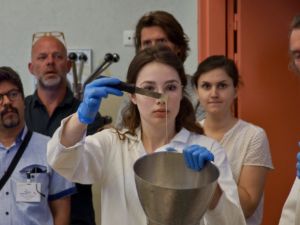 The TUTORIAL WORKSHOP FOR NEWCOMERS should serve as a focal point for scientists, engineers, academicians, graduate and undergraduate students, fellows, professionals and associates who want to start R&D projects on geopolymer science and technologies. The TUTORIAL will be led by the founder of geopolymer science, Prof. Joseph Davidovits, assisted by experienced technicians. It is aimed at providing a dedicated introduction to geopolymer technology and is illustrated with appropriate laboratory demonstrations. Participants will learn how to make 3 standard recipes for ceramic like application and for cement like use. You will be given the exact step by step recipes, the list of raw materials and chemical ingredients with the name of their suppliers. You are allowed to take photos and videos for you personal usage.
The TUTORIAL WORKSHOP FOR NEWCOMERS should serve as a focal point for scientists, engineers, academicians, graduate and undergraduate students, fellows, professionals and associates who want to start R&D projects on geopolymer science and technologies. The TUTORIAL will be led by the founder of geopolymer science, Prof. Joseph Davidovits, assisted by experienced technicians. It is aimed at providing a dedicated introduction to geopolymer technology and is illustrated with appropriate laboratory demonstrations. Participants will learn how to make 3 standard recipes for ceramic like application and for cement like use. You will be given the exact step by step recipes, the list of raw materials and chemical ingredients with the name of their suppliers. You are allowed to take photos and videos for you personal usage.
Fees: € 390 EUROS per participant.
Upon request, we will also deliver a certificate of attendance if your organization asks for it.
The GeopolymerCamp spans 3 days.
SPECIAL TOPICS OF INTEREST:
– Tutorial Workshop (short courses) for Newcomers, on Monday;
– Focused Sessions:
1- 3D printing: Geopolymer inks and Additive manufacturing.
2- Geopolymer solutions for Lunar / Martian habitats.
3- Archaeo-chemistry vs Geopolymer-chemistry.
MONDAY, July 7: TUTORIAL/WORKSHOP
08:15-09:00: Registration to TUTORIAL
09:00-14:00: Workshop and tutorial with laboratory demonstrations (Groups A + B) involving 3 standard recipes.
12:00-13:00: Free Sandwich Lunch Group B
13:00-14:00: Free Sandwich Lunch Group A
14:00-16:00: Short Courses and Q&A
————————-
14:00-16:00 Registration to GEOPOLYMER CAMP
TUESDAY, July 8: GEOPOLYMER CAMP
(preliminary schedule; Programme in progress)
08:30: Registration
09:00-09:15: Welcome and messages.
09:15-09:45: Keynote by Joseph Davidovits: State of the Geopolymer R&D, 2025 with special emphasis on recent developments.
09:45-11:00 First session: geopolymer molecular chemistry; raw materials, scientific investigations.
– Speakers to be determined.
11:00-11:30: Coffee break
11:30 Second Session: Special Focused To Be Determined:
– Speakers to be determined.
13:00 Free Sandwich Lunch
14:00-17:15: Third Session (part 1): industrial applications, building applications, eco-construction, LTGS, bricks, cements, concretes, CO2 mitigation, Global Warming.
– Speakers to be determined.
16:00-16:30 Coffee break
– Speakers to be determined.
16:50-17:15: Focused Session : To Be Determined
WEDNESDAY, July 9 : GEOPOLYMER CAMP
9:10-10:30: Focused Session : To Be Determined
– Speakers to be determined.
10:30-11:00: Coffee break
11:00 Third Session (part 2): industrial applications, building applications, eco-construction, LTGS, bricks, cements, concretes, CO2 mitigation, Global Warming
– Speakers to be determined.
13:15 – 15:30 Free Sandwich Lunch – Networking – Open discussions
– Groups – Discussions
– Materials Sciences + Products ; – Materials Technology & Engineering (+ civil engineering)
– Cements – Concretes (+ raw materials, adjuvants); – Sustainable / Eco Construction.
Promote:
If you would like to show your support for GeopolymerCamp and/or announce to everyone that you’re attending, consider adding the following images and link to your own blog, website, social bookmark, wiki, forum, chat, …

www.geopolymer.org
Sponsors:
Xatico: Performance Minerals for Geopolymer Solutions
XATICO sells, distributes and advises on mineral materials, offering a wide range of carefully selected products from the world’s best production sites. Its large customer base in Europe covers many industries, including geopolymers. XATICO’s team of experts provides technical and formulation support, customised distribution, consignment stock and delivery services throughout Europe.
Geosil®: Silicate binders and hardeners for geopolymeric systems
The Geosil® product line are the first aqueous silicate solutions specifically designed for geopolymerization. In addition, Woellner supplies a wide range of additives to help you achieve your desired properties.
Coffee, drinks, sandwiches, and parties for close to 100 people costs real money, and so we are more than happy to accept donations in-kind or financial gifts to help pull this off. If you would like to help out, please contact us.
In return for helping out, expect to see your company’s logo in this page, and also expect to hear profuse praise coming from the podium during announcements and much cajoling to patronize your company as one who made GeopolymerCamp a reality.
Groovy companies support GeopolymerCamp, helping us to have food, coffee, sandwiches, renting conference rooms – the essentials in life. Please visit their sites, check out their products, and give them your money.
Visa
We will be pleased to send you a formal invitation to get a visa. However, because we do not want to have any problems with the immigration authorities, you will have to book your hotel and show proof of reservation (they need to know where you will stay the first nights), and if we don’t know you or your organization, you will have to introduce yourself and give some references. We are sorry about this constricting procedure. If you have any question, do not hesitate to ask.
Where?
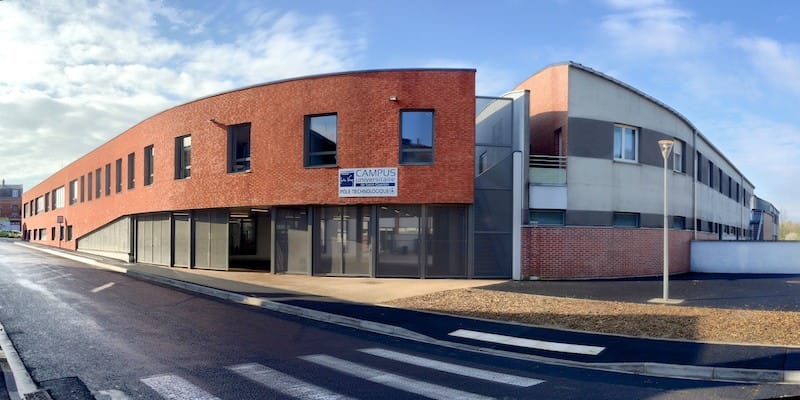
Campus Universitaire de Saint-Quentin (former IUT de l’Aisne), University of Picardie, 48 rue d’Ostende, 02100 Saint-Quentin, France.
Arriving by air, train or car: how to come to Saint-Quentin?
List of selected hotels, services and restaurants to help preparing your stay in Saint-Quentin. Everything you need to know is written there to enjoy your journey.
Does all that sound like fun? We sure hope it will be. Register soon before all the seats are gone (see below). We can only welcome a maximum of 105 participants.
Registration form: IS OPEN
FEES PAYMENT:
TUTORIAL WORKSHOP FOR NEWCOMERS (only 50 seats) :
- € 390 EURO, Payment in advance (by credit card or bank transfer, write us for other mean of payment)
GEOPOLYMERCAMP (only 115 seats) :
- € 75 EURO, Payment in advance (by credit card or bank transfer, write us for other mean of payment)
Please note: no registration will be definitive until we receive the full payment within one week. It means that, WE WILL REFUSE YOUR ADMISSION IF ALL SEATS ARE BOOKED AND SOLD OUT, we will not expect your coming, you will not get your name tag, your free lunch and other gratuities during the GeopolymerCamp. This is why it is mandatory to pay your registration before coming to France. However, there is no reimbursement for any fees (one exception only: if you get no visa, you may receive a refund).
How to pay:
– Credit Card: immediate payment, registration is immediately secured and valid.
– Bank transfer: you must place your order and proceed to immediate payment. Registration will be cancelled if no payment is received within one week.
REGISTER HERE TO THE GEOPOLYMERCAMP REGISTER HERE TO THE WORKSHOP
Notice. The Workshop fees DO NOT include the GeopolymerCamp registration. You have to register both, if you want to attend both sessions.
Privacy statement.
We’ll use this information to:
- Reserve your place at GeopolymerCamp
- Provide you with a personalized name tag
We’ll use this information to keep you informed less than ten times per year about news or other plans provided by the Geopolymer Institute, and to gather demographic data yielding visitors statistics. Any information gathered using this form will not be given, sold or traded to anyone outside of the Geopolymer Institute for any reason.
We consider all messages received as confidential because they may contain information that is privileged and exempt from disclosure. We will not transmit to third parties your e-mail address. According to the French law (art. 34 of the law “Informatique et Libertés” ( Computer and Liberty ) 6-jan-1978), you have the right to access, edit, modify and delete all data concerning you. To apply this right, please write us. Read about our privacy statement to know more.

